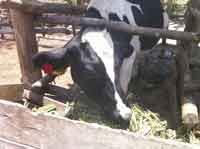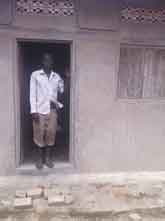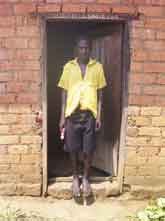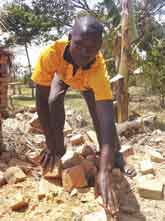Send a Cow charity throws a lifeline to rural Africa

In Uganda it’s not unheard of for children as young as 11 to head their own farming households. Rachel Jones joined Send a Cow on a trip to the southern district of Rakai, to see how the charity is improving the prospects of some very young farmers
Ask a 16-year-old in the UK what they’re most looking forward to and they might say “getting a car”. Ask a 16-year-old in Uganda the same question and they’re more likely to say ‘getting a cow’.
About 80% of Uganda’s economy is agricultural, and it shows. Goats and long-horned cows graze along the country’s biggest highways and narrowest dirt tracks. There isn’t a village or town you can drive through that doesn’t have a dairy collection centre, poultry and livestock feed supplier or maize milling plant, usually in a prime roadside location. There’s even a farmer on the 1000 shilling banknote – Uganda’s national currency.
Rakai District in the south-western region of the country is no exception. Chickens roam outside most of the houses we pass and plots are littered with haphazard banana plantations, but there’s one critical difference – more of the area’s farming households are run by children than anywhere else in the country.
A significant part of the story is geographical. Rakai shares a border with Tanzania in the south and in the late 1970s Ugandan soldiers, led by dictator Idi Amin, clashed with Tanzanian armies in a series of bloody battles. The region’s rural communities suddenly found themselves living, and farming, in the middle of a warzone.
In a further blow to the area, the first case of HIV/AIDS was diagnosed in Rakai in 1982, earning it the unenviable label of the “ground zero” or “epicentre” of AIDS. The war had left an already fragile infrastructure unprepared to deal with the devastating effects of the disease and by the mid 1980s the area was in the midst of a major epidemic.
The legacy of Rakai’s past lives on in the tens of thousands of orphans who are growing up in the region. Coming from rural families many of them inherit small acreages, but what they don’t always inherit is the experience and know-how to make those acres work.
According to Send a Cow project workers in Rakai, 14-year-old Godfrey Kimbugwe is a textbook case. His father died in 2001 and his mother left the household earlier this year to live with relatives after she became seriously ill. Living on a couple of acres with no goats or cows, he has no manure for his ailing banana and vegetable plantations and until recently his few scrawny chickens were kept tied on a string.
Godfrey cooks one meal a day, crouched over a basic wood-burning stove in a dark and smoky out-house, and he makes it last. No rain means no food, and when times are particularly hard he has to persuade a neighbour to let him work in their gardens for a few extra shillings.
When any new farmer joins Send a Cow they embark on a dizzying programme of training, carefully developed over the charity’s 25-year history to give farmers everything they need to build sustainable, organic businesses that last
There aren’t many teenagers in Britain who could imagine living on one meal a day, and there are fewer still who would admit to sharing Godfrey’s biggest worry – loneliness.
“Sometimes I feel like the house is going to swallow me up,” he tells me through a translator (he cannot afford to go to school and as a result has not had much opportunity to learn English). Some days I cook a meal and wait for my older brother to visit, but he doesn’t turn up and I don’t know how long he’s going to be.” On some occasions Godfrey can wait three hours, on others it’s three weeks.
Godfrey has been part of the Send a Cow programme for three months, but children as young as four are referred to the charity after losing one or both of their parents. Send a Cow’s Aggrey Nshekanabo rightly pointed out that it might seem strange in the UK to mark out a four-year-old for a life in agriculture, “but in an agricultural economy, it’s easy to link the two”, he says.
When any new farmer joins Send a Cow they embark on a dizzying programme of training, carefully developed over the charity’s 25-year history to give farmers everything they need to build sustainable, organic businesses that last. It might be how to make compost and test when it’s ready; how to build basic slurry collection pits; how to make an organic pesticide from ash, cow’s urine and chillies; how to mulch plantations to minimise water evaporation; how to graft mango seedlings, prevent diseases or prepare a simple budget.
However, when the farmers in question are children, and don’t know how to trim their fingernails let alone cultivate five acres of rugged land, the charity’s approach requires a bit of tweaking.
As its name suggests, a core part of Send a Cow’s work involves providing livestock, but in Rakai it can be months before the programme starts to take an agricultural slant, and years before the young farmers see so much as a goat.
Livestock extension worker Dennis Musuuza and social extension worker Robert Kaweireku Tamuzadde mentor more than 100 youngsters across Rakai and they start at the very beginning, with the basics of personal hygiene.
“We’ll sit down with them and show them how to trim their nails, or shave their head,” says Robert. “On one level this is simply about good health and hygiene, but on another level it’s about laying the foundations of self-worth and dignity.”
Early on, youngsters are also taught about their rights. When parents die there can be squabbles over the demarcation of land, and it’s not uncommon for distant family members or neighbours to exploit a vulnerable orphan to add a few more acres to their own plots.



Robert and Dennis are so closely and personally involved in the farmers’ formative years that teenagers on the scheme come to see the pair as brother or father figures, asking for their advice on meeting girls, relationships, and even inviting them to their weddings. The fruits of their close guidance become apparent when we drive to meet 21-year-old Isaah Ssekamate – and it isn’t just hanging from his trees he cultivates.
When he was just 10 years old Isaah’s father died and his mother abandoned him and his three younger siblings, leaving Isaah to run the household. He inherited five unproductive acres and 10 chickens.
Eleven years on, and the 21-year old shows me around a lush, well-maintained enterprise producing groundnuts, aubergines, cabbages, tomatoes and plantains, complete with a purpose-built poultry and goat unit.
Send a Cow training is evident everywhere: distinctive keyhole and mandala gardens capture every drop of water; raised and covered nurseries prevent seedlings from predators and the intense sun; a hand-built washing-up station encourages high levels of hygiene; rudimentary guttering collects rainfall; and a fuel-saving stove with a chimney replaces an open fire.
Exactly the same tried-and-tested techniques are dotted around the farm owned by Deus Kasekende, a newly married 22-year-old. His four siblings were moved to an educational orphanage after their parents died, leaving Deus to scrape a living, alone, on four acres of barren soil.
Their aspirations might seem modest by Western standards, but when you ask them “what’s next?” every single one can roll off an ambitious list of expansions, improvements and diversifications.
Slightly further down the line than Isaah, Deus received a cow earlier this year, which yields enough milk to sell – usually around 16 litres a day. Not only has spreading the manure helped to almost double the yield of his banana plantation, the income from milk sales has allowed him to expand his poultry unit, which now houses dozens of local chickens. The birds are highly prized for their eggs – their rich and nutritious yolks as yellow as the T-shirt he is wearing when we meet – and they’re in such demand that one of our Ugandan guides, Esther Ssempebwa Nalubwama, buys 15 of them to take home for her family.
Every individual’s story is slightly different, but what unites every young Send a Cow farmer I meet is ambition. Their aspirations might seem modest by Western standards, but when you ask them “what’s next?” every single one can roll off an ambitious list of expansions, improvements and diversifications.
Deus has already turned his hand to coffee-growing and brick-making to supplement his income on the farm. To date he has bought an extra half-acre of land through sales of coffee and bricks alone, and he has plans to buy many more.
As for Isaah, “I dream about knocking down the poultry unit and building a bigger one,” he says. “At the moment I’m just selling them on because I don’t have the space. I also want buy a cross-breed heifer, which I’m hoping to buy from the proceeds of selling my goats. I’ll extend the goat shelter to accommodate the cow.”
Ugandans are convinced that Send a Cow works. When neighbouring farms see yields increasing and healthy livestock milking well, they copy the techniques. Governments are convinced too. The Ministry of Agriculture and Animal Resources in Rwanda is adopting Send a Cow’s approach in its latest development strategy, pledging livestock for every impoverished family over the next decade. Even Prince Charles is convinced. He became president of Send a Cow this year – a position he will hold for the next five years.And when His Royal Highness’s term with the charity comes to an end, Godfrey – the lonely 14-year-old farmer I met in Rakai – might just have a cow of his own.
HOW TO DONATE
If you would like to give to Send a Cow, you can do it in three ways:
· Send a cheque made payable to Send a Cow to: The Farmers Weekly Christmas Campaign, The Old Estate Yard, Newton St Loe, Bath BA2 9BR or
· Visit the Send a Cow website or
· Telephone on 01225 874 222 (lines manned between 9am and 5pm)
If you would like to give to Farming Help, you can do it in two ways:
· Send a cheque made payable to Farming Help to: The Farmers Weekly Christmas Campaign, c/o RABI, Shaw House, 27 West Way, Oxford, OX2 0QH or
· Visit the Just Giving website.
Money sent to Farming Help will be split equally between the three charities involved.
